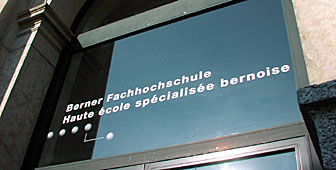Spirit of Bike: environment-friendly transport

A solar powered bicycle developed by the Biel Engineering School may be a first step towards revolutionising transport.
The “Intellibike” is an environment friendly means of transport, and its creators in Biel hope it will encourage physical fitness and spur the development of cleaner technologies.
“It’s not just an experimental vehicle, but a platform for promoting innovative transport technology,” explains August Pfluger, a spokesman for the project. The aim is to encourage technological research in the field of sustainable development.
The “Spirit of Bike” team, which is depending on the bike to cover more than 3,000 kilometres in a race across Australia, has demonstrated that it is feasible to do things differently.
The technical challenge
It took the skills and resources of four departments to produce a bicycle prototype capable of mastering the Australian desert.
The school’s mechanical engineering, electrical engineering and IT departments were all involved in the project, while the automotive department contributed valuable information on aerodynamics and materials.
“Even though the Intellibike has no immediate practical application and is not marketable in its present form, the technology we’ve developed will soon be adopted in other fields,” said Andrea Vezzini, lecturer in mechanical engineering.
The World Solar Challenge offers a chance to compare notes with engineers from all over the world, and to engage public opinion, Vezzini told swissinfo.
New applications have already been discovered for the bike’s technology. “The rear-traction magnetic motor and the battery, which is considerably lighter and more powerful than existing units, are already transferable to other industrial applications. And the electronic components – what we might call the bicycle’s ‘intelligence’ – represent a minor revolution.”
The experiment in collaboration has also been a great success on the purely human level, workers at the Biel laboratory agree.
“It is great to be involved in a project with ambitious goals and be able to exchange knowledge and experience; there is an excellent atmosphere among the people concerned,” confirms Simon, a young electrical engineer.
How it started
The initial impetus came from the outside the School -“It was Von Salis Communication, a public relations company, who suggested we develop a solar-powered vehicle more in tune with the needs of ordinary people,” explains Professor Henry Schwarzenbach.
So it was decided to abandon the familiar format of solar-powered racing vehicles.
The School took up the challenge, drawing on the technological know-how and years of experience gained in developing the solar-powered Spirit of Biel vehicles. The task of seeking sponsors and raising interest fell to August Pfluger and his team.
Funding the project
Although the project was extremely costly, sponsors were soon offering their services. Siemens, Toyota Ecomotion and Zurich’s electricity company EWZ are a few of the donors who have wanted to show more than just solidarity with an environment-friendly project. All of them expect some return in terms of know-how and experience.
The Swiss Federal Agency for the Environment, Forests and Landscape is also providing financial support. “We believe that an electric bicycle may in the future be an alternative to scooters and help improve the urban traffic situation,” explains its spokesman, Felix Reutimann.
“Obviously, it will not be this experimental model that revolutionises the transport scene, but we are looking forward to future applications.”
Future prospects
The Spirit of Bike venture is already proving to be more than a race through the vast deserts of Australia. The start of the competition marks the end of the initial phase of research, but the project is by no means over.
“We no longer need to keep things under wraps,” says Vezzini. “The vehicles are ready for the race and no further changes can be made. Now we shall know what the others have been doing. We shall be discovering what materials and technological solutions each has opted for.”
The information gathered in Australia is confirming the hopes of the Biel team. The solutions devised in the shadow of the Jura mountains are well up to international standards.
by Daniele Papacella

In compliance with the JTI standards
More: SWI swissinfo.ch certified by the Journalism Trust Initiative
You can find an overview of ongoing debates with our journalists here . Please join us!
If you want to start a conversation about a topic raised in this article or want to report factual errors, email us at english@swissinfo.ch.